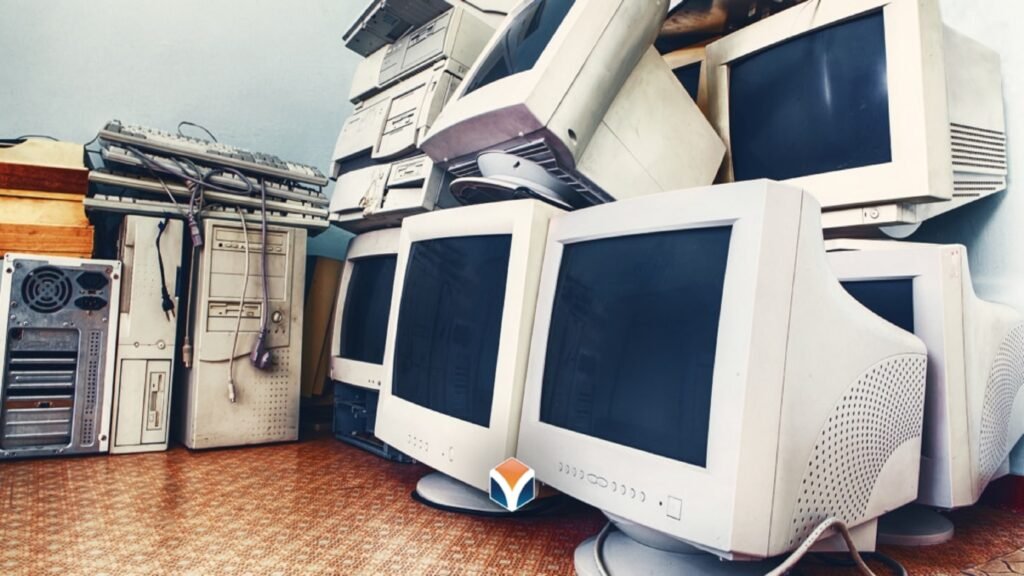Dispose of old electronics responsibly is crucial for environmental sustainability. Electronic waste, or e-waste, contains harmful materials that can pollute soil and water. Recycling centers specialize in safely handling these materials, ensuring they don’t end up in landfills. Many manufacturers also offer take-back programs, making disposal easier.
Proper disposal not only protects the environment but also conserves valuable resources. By recycling electronics, you help reduce the demand for raw materials and minimize environmental impact. Always check local guidelines and resources for e-waste disposal options. Following these practices ensures you contribute to a cleaner, safer planet.
Why Dispose Of Old Electronics Properly
Dispose of old electronics properly is important for both the environment and our health. Old devices contain harmful materials. These can damage our planet and our bodies if not handled correctly. Learning the right way to dispose of electronics can make a big difference.
Environmental Impact
Electronics contain materials that are bad for the environment. These materials include lead, mercury, and cadmium. When electronics are thrown away in landfills, these materials can seep into the soil and water.
Here are some important points to consider:
- Soil Contamination: Harmful chemicals from electronics can poison the soil.
- Water Pollution: These chemicals can get into our water supply, making it unsafe.
- Air Pollution: Burning electronics releases toxins into the air, which we then breathe in.
Proper disposal methods help prevent these problems. Recycling electronics is one of the best ways. Many parts of old devices can be reused. This reduces the need to mine new materials, which also harms the environment.
Some places have special programs for electronic waste. These programs make sure the harmful materials are handled safely. By using these programs, we can keep our planet cleaner and safer.
Health Risks
Improper disposal of old electronics can pose serious health risks. The harmful materials in electronics can affect our bodies in many ways.
Here are some key health risks:
- Lead Poisoning: Lead can damage the brain and kidneys, especially in children.
- Mercury Exposure: Mercury can harm the nervous system and is dangerous even in small amounts.
- Cadmium Toxicity: Cadmium can cause lung and kidney problems.
These health risks are serious. People who work with electronic waste are at high risk. They can be exposed to these harmful materials daily. This can lead to long-term health problems.
Recycling electronics reduces these risks. Proper recycling makes sure that harmful materials are handled safely. This protects both the workers and the general public. It is important to find certified e-waste recycling centers. These centers follow strict guidelines to ensure safety.
Local E-waste Regulations
Dispose of old electronics can be tricky. Local e-waste regulations make it even more complex. Knowing the right way to dispose of electronics is important. It helps protect the environment and avoids fines. This guide will help you understand the rules better.
State Laws
State laws on e-waste disposal vary. Some states have very strict rules. California is one of them. You cannot throw electronics in the trash. Instead, you must take them to a recycling center. New York also has strict laws. Retailers must accept old electronics for recycling. Many states have similar rules.
Here are some important points:
- California: Must use approved recycling centers.
- New York: Retailers must accept old electronics.
- Texas: Offers free recycling programs.
- Illinois: Bans e-waste in landfills.
Understanding your state laws is crucial. Failing to follow them can lead to fines. Always check your state’s website for the most current rules. This helps you stay compliant and environmentally friendly.
City Guidelines
City guidelines can differ from state laws. Some cities have their own rules. San Francisco has a zero waste goal. Residents must recycle all electronics. New York City offers curbside pickup for e-waste. Smaller cities may have fewer options.
Here are some examples:
| City | Guideline |
| San Francisco | Zero waste goal, must recycle all electronics |
| New York City | Offers curbside pickup for e-waste |
| Chicago | Has drop-off locations for e-waste |
| Austin | Runs free e-waste recycling events |
Check your city’s website for specific guidelines. Following these rules helps keep our cities clean. It also protects the environment. Knowing both state and city rules ensures you dispose of electronics correctly.
Recycling Options Available
Proper disposal of electronics is essential. It helps protect the environment and keeps toxic materials out of landfills. There are many recycling options available. You can choose the one that suits your needs best. Let’s explore some of these options.
Certified E-waste Recyclers
Certified e-waste recyclers ensure that your old electronics are handled safely. They follow strict guidelines to recycle or dispose of e-waste. Certified recyclers prevent harmful substances from polluting our environment. They also recover valuable materials from old devices.
Here are some benefits of using certified e-waste recyclers:
- Proper handling of hazardous materials.
- Data security: Ensuring all personal data is destroyed.
- Environmental protection: Reducing pollution and conserving resources.
To find a certified e-waste recycler, you can check with local waste management services. Many recyclers have websites where you can get more information. You can also search for certified recyclers through online directories. Look for certifications such as R2 (Responsible Recycling) and e-Stewards. These certifications ensure that the recycler follows industry best practices.
Retailer Programs
Many retailers offer programs to recycle old electronics. These programs make it easy to dispose of e-waste responsibly.
Here are some popular retailer programs:
| Retailer | Program Details |
| Best Buy | Accepts most electronics. Offers trade-in for certain items. |
| Staples | Free recycling for office electronics. Rewards for recycling ink cartridges. |
| Apple | Trade-in program. Offers credit towards new purchases. |
Retailer programs often provide incentives. These can include store credit or discounts on new purchases. Check the retailer’s website for more details. Some programs also offer mail-in options. This is convenient if you cannot visit the store in person. Always make sure to reset your devices before recycling. This ensures that your personal data is safe.
Donation And Reuse
Proper disposal of electronics is crucial for both the environment and our health. Instead of throwing them away, you can donate or reuse these devices. Donation and reuse help reduce electronic waste and support community members in need.
Nonprofits
Many nonprofit organizations accept old electronics. These groups refurbish and distribute them to people who need them. This helps those who can’t afford new devices and reduces electronic waste.
Some popular nonprofits that accept electronics include:
- Goodwill: Accepts computers, phones, and other gadgets.
- Salvation Army: Takes a variety of electronics for resale.
- Computers with Causes: Donates refurbished computers to students and families.
Donating to these organizations is simple. You can drop off your electronics at their locations. Some even offer free pickup services. Make sure to erase all personal data from your devices before donating.
Community Programs
Local community programs also play a big role in electronic disposal. These programs often organize collection events. People can bring their old electronics to these events for proper disposal or reuse.
Many communities have e-waste recycling events. These events ensure safe disposal of hazardous materials in electronics. Check with your local government for upcoming events.
Schools and libraries sometimes have programs to collect old devices. They use these devices for educational purposes. This helps students learn and reduces electronic waste. Your old electronics can make a big difference in someone’s life.
Safe Data Destruction
Disposing of electronics can be tricky. It is important to ensure that your old devices do not harm the environment. Safe data destruction is also crucial. You must ensure that your personal information does not fall into the wrong hands. Let’s explore the best ways to wipe your devices and destroy them physically.
Wiping Devices
Before discarding any electronic device, wiping the data is essential. Start by backing up your important files. This way, you can access them later if needed.
Next, you should reset your device to its factory settings. This process varies depending on the type of device:
- Smartphones: Go to Settings > System > Reset options.
- Computers:</s
Creative Repurposing Ideas
Disposing of electronics can be tricky. But you can do it in fun and creative ways. Repurposing old gadgets can help the environment. Plus, you can make something new and useful out of them. Let’s explore some creative repurposing ideas together!
Upcycling Projects
Upcycling electronics can be very rewarding. Old phones can become cool clocks. All you need is a few simple tools. Outdated computers can turn into mini aquariums. Remove the insides and add a glass tank.
Here are some more ideas:
- Tablet as a digital photo frame – Display your favorite photos
- Keyboard keys as fridge magnets – Fun and functional
- CDs for garden décor – Reflect sunlight in your garden
Upcycling not only helps reduce waste. It also gives a new life to old items. Plus, it can be a fun project for the whole family. Get creative and save the planet at the same time!
Diy Uses
DIY uses for old electronics can be quite fun. Old circuit boards can become unique jewelry. You can make earrings or a necklace. Unused cables can be transformed into colorful bracelets. It’s a great way to keep memories alive.
Consider these DIY projects:
- Turn a mouse into a nightlight – Light up your room
- Use old headphones as plant hangers – Stylish and eco-friendly
- Make a lamp from an old camera – Unique home décor
DIY projects are great for learning new skills. You can teach kids about recycling while making something cool. Each project helps reduce e-waste. Plus, you get to create one-of-a-kind items.
Frequently Asked Questions
How To Dispose Of Old Electronics?
Recycle old electronics at designated e-waste centers. Check local regulations for proper disposal methods.
Where Can I Recycle Electronics?
You can recycle electronics at local e-waste recycling centers, retail stores, or through manufacturer take-back programs.
Can I Throw Electronics In The Trash?
No, throwing electronics in the trash is harmful. They contain hazardous materials that require proper disposal.
Why Is Electronic Waste Harmful?
Electronic waste contains toxic substances like lead and mercury. Improper disposal can harm the environment and human health.
Are There Free E-waste Recycling Options?
Yes, many communities offer free e-waste recycling events. Some retailers also provide free recycling services.







